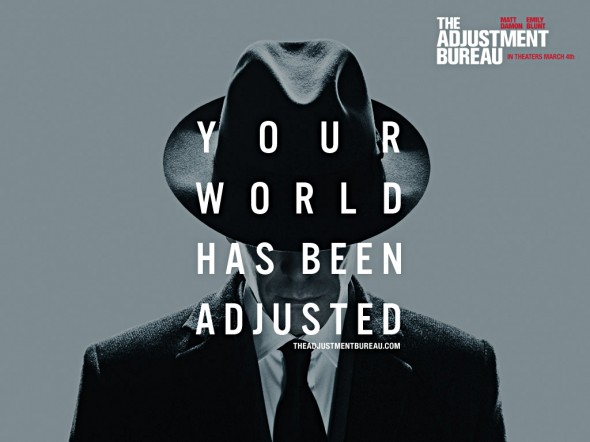The Adjustment Bureau
Posted on March 3, 2011 at 5:54 pm
The first great movie of 2011 is thought-provoking, exciting, and swooningly romantic. Writer/director George Nolfi takes on the biggest questions of all — faith and doubt, fate and free will, God, love, the meaning of existence — with an absorbing story about who we are and why we do what we do.
Matt Damon plays David Norris, a popular politician with a bad habit of losing control that has just cost him an election. As he gets ready to deliver a safe and appropriate concession speech, he has a brief meeting with a young woman and feels an immediate connection. And then he gives the concession speech and it is frank and outspoken and of course, appealing to the voters who find his candor refreshing. His political prospects are bright again, but he can’t stop thinking about the girl.
We’re used to seeing people, especially people in power, surrounded by fixers, arrangers, smoothers, tweakers — publicists, managers, agents, advisers, lawyers. David has those, including his best friend/campaign manager. But there is something different going on. There are men in hats giving each other odd directions with a strangely compelling sense of urgency, as though they are organizing a rocket launch. But why would someone be deployed to spill coffee on David’s shirt?
To keep him off a bus, for one reason (though the deeper reason will not be revealed for a while). But the coffee isn’t spilled in time. He gets on the bus. And the girl from election night is there. Her name is Elise (Emily Blunt). She is a dancer. And David is besotted with her.
The men in hats are from an Adjustment Bureau. They have enormous power and a secret system of doorways that allow them to bypass miles in a few steps. The hat men step out of the doorways like a less cheery version of the minions who keep things running smoothly at Disney World.
The Adjustment Bureau doesn’t want David and Elise to be together, and they are acting on the highest authority. But even that authority cannot stop the most powerful force in the universe.
A knockout cast and imaginative visuals provide a sumptuous setting for the romance. Anthony Mackie, moving with the graceful economy of a cheetah, is the Adjuster who has come to care for his charge. Other Adjusters include “Mad Men’s” John Slattery as a harried bureaucrat and Terence Stamp as the ruthless enforcer brought in when all else has failed. Damon makes David intelligent, brave, sensitive, vulnerable, curious, and great-hearted, and Blunt makes Elise everything a man like that would be willing to risk it all for. There are a few surprising rough edges for such a well-crafted story. Elise’s reason for being in the men’s room where she meets David for the first time is oddly off-putting, a loose end that is never explained. And a story David tells about his political inspiration would have to have occurred about 15 years before he was born, unless he is the youngest-looking baby boomer in history. But what does work in this movie works exceptionally well, a bracing engagement with the reason for everything that gives us a good reason to remember this movie for a long time.



